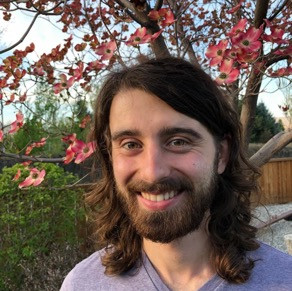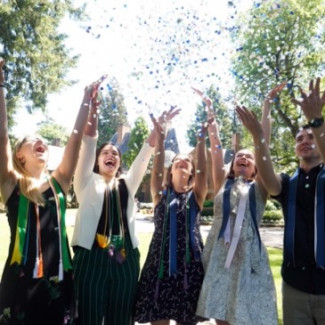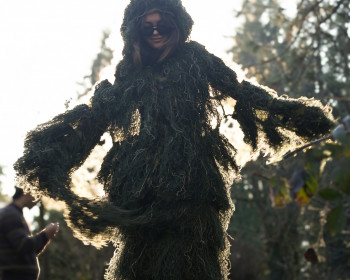National Science Foundation Honors Two Alumni
Two recent Lewis & Clark alumni have been awarded National Science Foundation Graduate Research Fellowships. Three other L&C alumni have been given honorable mentions.
by Franchesca Schrambling BA ’22
Many Lewis & Clark College students use their education to help make the world a better place. The National Science Foundation (NSF) is helping our students achieve this goal by recently awarding Graduate Research Fellowships to Sean Richardson BA ’20 and Ravyn Malatesta BA ’19, while Isaac Goldstein BA ’16, Lucy Lurie BA ’15, and Grace Shaw BA ’17 received honorable mentions.
The NSF has honored many L&C alumni in the past. Created in 1950 “to promote the progress of science; to advance the national health, prosperity, and welfare; to secure the national defense,” the foundation has supported research and individuals to create knowledge and change the future. The NSF Graduate Research Fellowships are one of many academic awards and fellowships that L&C alumni have received.
The NSF Graduate Research Fellowship provides support for three years of graduate study in science, technology, engineering, or mathematics (STEM), as well as eligible social science fields or STEM education leading to a research-based master’s or doctoral degree. Their fellows benefit from three-year annual stipends and education allowances that help cover tuition and fees, opportunities for international research, and freedom to conduct their own research at accredited U.S. institutions of graduate education.

Since graduating, he has been working as an algebra tutor and AmeriCorps fellow in Washington, D.C., with Saga Education company, a camp counselor for the Ross Mathematics Program summer camp, and as an assistant for Art of Problem Solving’s online math classes.
The Portland native will be starting a mathematics PhD program in the fall at the University of Washington, aiming to improve his teaching skills, delve into new research projects, and work in math education and outreach. His experiences at L&C have been pivotal for shaping his post-graduate career.
Opportunities at L&C for Richardson to participate in undergraduate research and to develop professional skills were indispensable. During his summers in the Rogers Science Program he worked on an interdisciplinary computer science and environmental studies project with Professors Peter Drake and Jessica Kleiss to train a neural network to identify clouds in sky images. He then researched pure mathematics with Professor Liz Stanhope, studying resonance frequencies of an abstract mathematical object to understand its geometric properties.
“Many schools have similar academic programs and research opportunities, but L&C excels in the level of care, attention, and encouragement that professors provide,” Richardson said.
Malatesta graduated in May 2019 with a double major in chemistry and economics, along with a minor in mathematics. She initially chose to attend L&C because of the international affairs program, but ended up pursuing other ventures and finding amazing support from progressors and friends along the way. During her time at L&C, she was a peer tutor both in the SQRC and with the Student Academic Affairs Board (SAAB), a teaching assistant for organic and physical chemistry lab classes, and coled GeMSTEM, a group for gender minorities in STEM disciplines at L&C.
By her senior year, she was confident that she wanted to go to graduate school. She completed both of her honors theses and applied for graduate school, as well as the NSF program. Malatesta’s ultimate goal is to teach, ideally at a place like L&C.
Since the NSF program is not tied to specific research outcomes, it provides the freedom to research without specific project expectations. The application process consists of two major components that are reviewed based on intellectual merit and broader impacts: a personal and future goals statement as well as a research proposal.
Malatesta is currently a graduate student at Georgia Institute of Technology and intends to continue research in developing a novel experimental technique that takes advantage of the quantum mechanical nature of light.
Her experience applying for graduate school and fellowships were deeply impacted by her experiences at L&C. Malatesta remarked, “I had so many meaningful connections with my professors that it made picking references for my applications difficult. I had more references than I could actually submit.”
She also looks forward to teaching a class as part of Georgia Tech’s Tech to Teaching program, which is designed for graduate students with career goals in academia. She aims to design a class about the intersection of science and advocacy, inspired by the L&C chemistry department’s book club last summer for current students, faculty, and alumni.
“One of the most important parts of my college experience were the relationships I made with my professors and advisors. Even two years after my graduation, I’m still in regular contact with both of my major advisors, Anne Bentley and Cliff Bekar,” Malatesta said. “The biggest lesson I learned at L&C, which I still am working on now, is how to ask for help when I need it. L&C has an incredibly supportive and receptive community who want to help you succeed.”
More Newsroom Stories
Public Relations is located in McAfee on the Undergraduate Campus.
MSC: 19
email public@lclark.edu
voice 503-768-7970
Public Relations
Lewis & Clark
615 S. Palatine Hill Road MSC 19
Portland OR 97219


